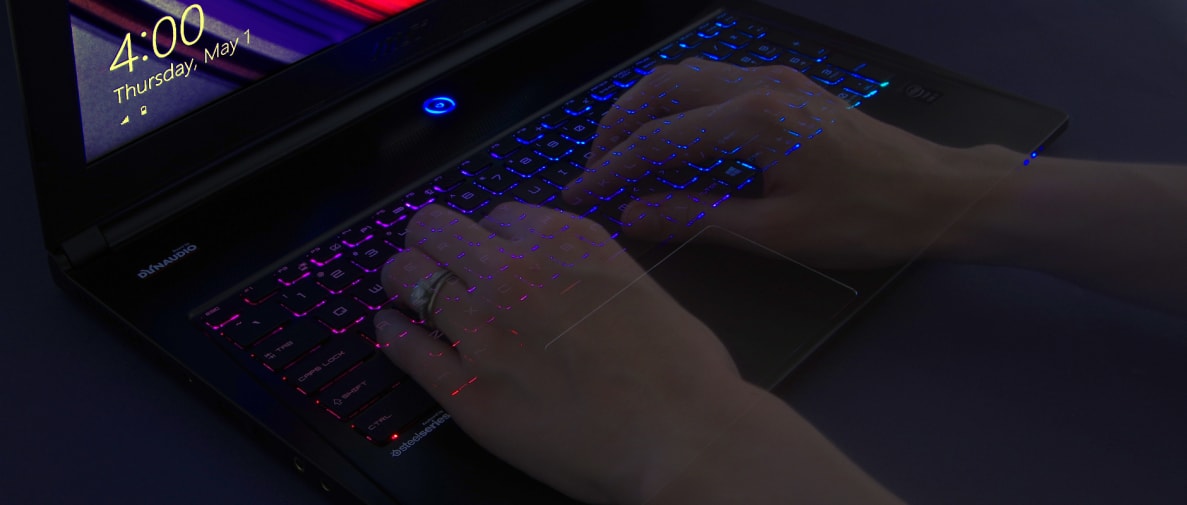MSI put the Ghost on a diet, but don't let its slim figure mislead you: This machine packs an Nvidia GeForce GTX 860M graphics card, an Intel Core i7-4700HQ quad-core processor, and 16GB of RAM. There's also a 128GB solid-state drive for the operating system partition—Windows 8.1, of course—and an additional 750GB hard drive for everything else.
The Ghost's slim profile is a sight to behold, but the question remains: Is this really necessary? For gamers who occasionally need to wander into the bright light of the outside world, its combination of size and power is admirable. But is $1,700 asking too much for what this system offers?
Look & Feel
Incredibly thin, and also a bit flimsy
Be prepared to gawk at the GS60 Ghost—it's by far the thinnest gaming laptop I've ever seen. Weighing just 4.3 pounds (without the charger) and measuring just under an inch thick, the Ghost's portability is definitely its major selling point. While laptops may come in all shapes and sizes, gaming laptops typically stretch the limits of what a sane person would consider portable.
Open up the Ghost and you'll first find a glare-resistant 1080p screen. Sure, it's not the highest end display on the market, but I have no complaints about this offering. It's bright enough to enjoy in a sunny room, colors are accurate, and it's sharp enough that it won't hold you back in games where you want to ramp up the visual quality.
Below the screen is a full-size, backlit keyboard designed by gaming company SteelSeries. While traditional gaming laptops have thick, chunky keys, MSI's SteelSeries peripheral opts for a chiclet-style keyboard like you'd find on any other ultrabook—and that feels kind of wrong. Chunky gaming keyboards offer your fingers more comfort for hours-long gaming sessions, plus they have more travel when typing. The Ghost's typing interface isn't terrible, but it's not ideal, either.
There's also the issue of quality. Both the keyboard and laptop cover feel stunningly cheap for such an expensive machine. Pressing down on either causes way too much bending on a $1,699 product. How this holds up over time is anyone's guess, but for gamers who may abuse their systems, it's a concern.
{{ photo_gallery "design" }}
Another concern is heat management. Two really thick gaming laptops that we've reviewed—the Asus ROG G750JZ-XS72 and the Aienware 17—handled heat pretty well. With compressed size comes less space to move air around, and MSI's ultra-thin Ghost gets a bit toasty. In our tests it registered readings of over 137° F after we ran some gaming benchmarks designed to simulate gameplay. That's about 11° more than the Alienware, and 14° more than the Asus rig.
At least the Ghost offers a good selection of ports. You'll find three USB 3.0 slots in total, a card reader, an HDMI output, a mini DisplayPort, and an ethernet jack, plus the requisite headphone and microphone jacks. Whether you're a gamer, a power user, a creative photographer, or some combination of the three, the Ghost has you covered.
Performance
The price to performance ratio isn't strong with this one.
MSI packages the GS60 Ghost with Nvidia's mid-tier mobile graphics card, the GTX 860M. Our previous experience with Nvidia's new line of graphics cards was with the higher-specced GTX 880M, found in the Asus ROG G750JZ-XS72, and it was incredibly powerful. Spoiler alert: The GTX 860M in the Ghost can't hold a candle to it's higher-tier relative.
Does that mean MSI's latest gaming rig can't actually play games? Not at all, but really demanding games such as Battlefield 4 won't be rendered to their full potential.
We've been testing the current crop of laptops with the game Metro: 2033, which puts any graphics card through its paces. Playing this game on high settings is possible on the Ghost, but not advisable: It only produced an average framerate of 26.5 FPS. Any result under 30 FPS will be noticeably choppy, so stick to medium settings, which net a much smoother 34 FPS.
A $1,699 price tag seems like a lot for something that isn't the best in its class, but the value proposition for gaming laptops is different. Even though the Asus G750JZ-XS72 beat the Ghost in every performance test, it also costs nearly twice as much. For a better performance comparison, consider the Lenovo Y510p. The MSI had very similar results to Lenovo's gaming rig, besting it ever so slightly in most tests. The Lenovo Y510p, however, costs much less: You can find it for slightly over a grand.
And there lies the Ghost's biggest problem: It still costs too much for what it does. This Ghost's test results in programs like PCMark 8 and GFXBench are above-average, but they simply pale in comparison to its thicker gamer-centric competition. About the best fit we can envision is for people looking for a mobile workstation that can do both creative work and game with ease. To that end, the Ghost can handle taxing applications like Adobe Photoshop without a problem, with tons of built-in memory going to good use.
If you do go that route, just don't stray too far from an outlet. Using PCMark 8's battery life test, I clocked just barely longer than 2 hours of usage. Since the PCMark test takes web browsing, gaming, photo editing, and video chatting into account, you can expect longer battery life if you're just web browsing. Then again, if you're just browsing the web, why are you buying a $1,699 gaming laptop?
Software
For this much money, we expected less junk.
Expensive laptops usually give you a bare minimum of pre-installed programs that you won't ever use. With that said, the MSI GS60 Ghost packages a bunch of apps and games that have no business on a gaming rig.
The WildTangent Games app is a collection of casual-friendly video games that enthusiasts couldn't care less about. Worst of all, they aren't even free to play. Hardcore gamers—you know, the type that MSI is appealing to with the Ghost—will be getting all their games on services like Steam, GoG, and Origin.
Some of these apps will make you scratch your head in disbelief. A cook book app on a gaming laptop? Gamers gotta eat, I guess. And the Norton AntiVirus program on the Ghost is one of the most annoying we've seen recently: There are constantly popups reminding you to scan this and upgrade that. Gamers don't want to be bothered with real life reminders, let alone an annoying program.
{{ photo_gallery "screenshots" }}
The only pre-installed app that you'll want to use is Nvidia's GeForce Experience. This handy program will help keep your video card drivers up-to-date, as well as optimizing the settings for your installed games. If you opt-in for beta drivers, you can even take advantage of game streaming to an Nvidia Shield, and also capture video of your gaming accomplishments.
Sure, the Shield is an expensive peripheral. But with a laptop this lightweight and Shield streaming built-in, you could easily keep the Ghost in a bag, plug it in wherever you are, and use the Shield as a portable gaming rig on the go. Limited use case? Sure. Awesome? You betcha.
The Verdict
Great for fragfests when the boss isn't looking.
Judged on its own merits, the GS60 Ghost is an impressive specimen: It's an ultra-thin powerhouse that can crank through whatever throw at it—just don't expect to play games on the highest settings.
The Ghost is truly a niche product. While it's marketed towards gamers that crave portability, I'd also pitch this product towards gamers that also need a powerful work computer. With a travel weight of just 5.7 pounds, the GS60 Ghost won't murder your shoulders like a more powerful (and chunkier) rig would. It's also much more powerful than many ultrabooks on the market, giving you the flexibility to take on demanding applications where other lightweight computers would struggle.
But price is the deciding factor with many purchases, and the Ghost will spook those looking for a bargain. For gamers looking for a new go-to rig, the GTX 860M graphics card may not cut it. It's no slouch, but it's also not in the same league as higher-end cards. The GS60 Ghost offers just slightly better performance than the much less expensive Lenovo Y510p, which uses dual Nvidia GeForce GTX 750M cards. And despite the price bump, questionable construction and a chintzy keyboard give us pause. The Ghost is an appealing prospect that combines both power and portability into one machine, but being a jack of all trades also means being an ace of none.
Meet the tester
An enthusiast of all things tech, Josh is one of Reviewed.com's resident television experts. When he's not looking at bright TV screens in a dark room, he's probably reviewing a laptop or finding a new snack at 7-11.
Checking our work.
Our team is here for one purpose: to help you buy the best stuff and love what you own. Our writers, editors, and lab technicians obsess over the products we cover to make sure you're confident and satisfied. Have a different opinion about something we recommend? Email us and we'll compare notes.
Shoot us an email



